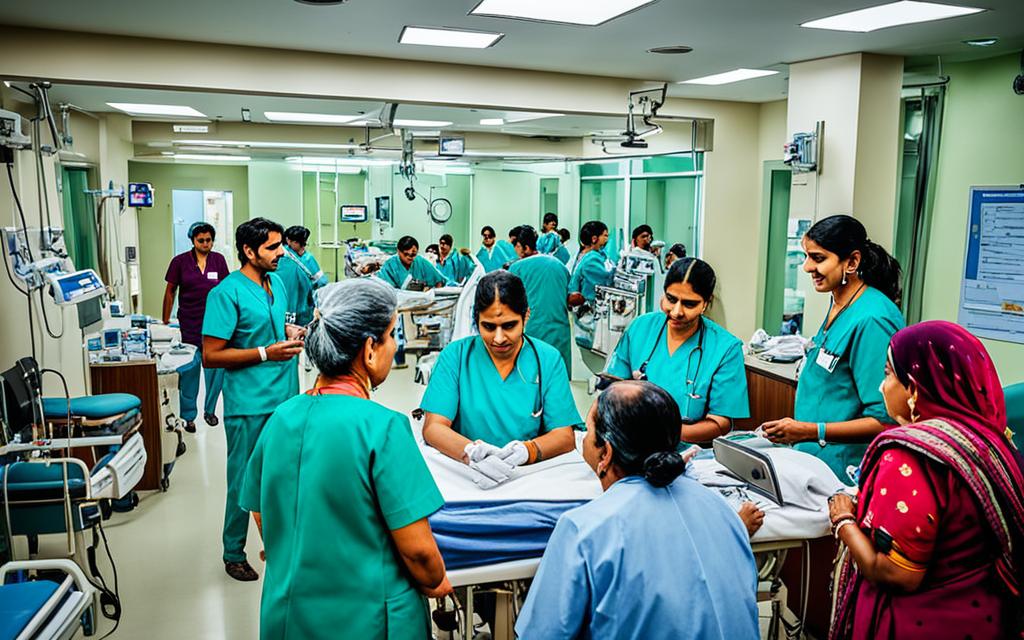Welcome to a comprehensive guide on the Indian healthcare system, with a specific focus on the quality of care and healthcare services in India. This article aims to provide valuable insights for individuals seeking healthcare or considering relocation to the country.
India’s healthcare system encompasses a diverse spectrum of services and facilities catering to the healthcare needs of its vast population. With advancements in medical technology and a growing pool of healthcare professionals, the country offers a range of healthcare options.
When it comes to quality of care, India has been making steady progress in recent years. Renowned hospitals and medical institutions in India uphold high standards, utilizing state-of-the-art equipment and implementing best practices in patient care.
From primary healthcare centers to specialized hospitals, the healthcare infrastructure in India is constantly evolving to meet the growing demands of its population. India boasts a network of medical facilities equipped to address a wide array of healthcare needs, including advanced treatments and surgeries.
One significant aspect of the Indian healthcare system is the coexistence of both public and private healthcare sectors. While the public healthcare system aims to provide affordable and accessible healthcare services to all, the private sector offers a wider range of choices and often caters to those seeking specialized or advanced medical treatment.
However, challenges in the Indian healthcare system persist. Accessibility to healthcare services across the country, particularly in remote areas, remains a concern. Additionally, healthcare costs can be a burden for many, making it crucial to explore healthcare insurance options and plan for potential medical expenses.
For expatriates or individuals planning to relocate to India, understanding the healthcare system and available facilities is essential. Many healthcare options are tailored to meet the needs of expatriates, providing comprehensive coverage and ensuring access to quality healthcare.
In conclusion, the Indian healthcare system offers a wide range of healthcare services with an increasing focus on quality of care. While there are challenges to address, the multitude of healthcare options and advancements in medical practice make India an attractive destination for healthcare services and relocation.
Stay tuned for the upcoming sections of this article, where we will delve deeper into the healthcare infrastructure, public and private healthcare systems, quality of care in Indian hospitals, challenges faced, and healthcare considerations for expatriates and individuals relocating to India.
Overview of healthcare services in India
When it comes to healthcare, India offers a robust infrastructure with a wide range of medical facilities and highly skilled healthcare professionals.
The healthcare infrastructure in India is continually evolving and expanding to meet the growing needs of its population. From state-of-the-art hospitals to specialized clinics and research centers, the country offers a comprehensive range of healthcare services.
Medical facilities in India are equipped with modern technology and advanced medical equipment, ensuring accurate diagnoses and effective treatments. These facilities cater to both national and international patients, with many renowned hospitals attracting medical tourists from around the world.
India is also home to a large pool of highly skilled healthcare professionals. The country boasts a strong network of doctors, nurses, and specialists trained in various medical disciplines. Many healthcare professionals in India have gained recognition globally for their expertise and contributions to the medical field.
From primary care to specialized treatments, the healthcare services available in India cater to a wide range of medical needs. These services include preventive care, diagnosis, surgery, rehabilitation, and post-operative care.
Whether you require routine check-ups, advanced surgeries, or specialized treatments, you can find a wide array of healthcare services in India that prioritize quality and patient care.
Public vs. private healthcare in India
When it comes to healthcare in India, individuals have the option to choose between the public and private healthcare systems. Understanding the differences between these two sectors is crucial for making informed decisions about healthcare options in the country.
The public healthcare system in India is operated and funded by the government. It aims to provide affordable healthcare services to the general population, with a focus on fulfilling the healthcare needs of economically disadvantaged individuals. Public healthcare facilities, such as government hospitals and clinics, offer medical services at subsidized rates or sometimes even for free.
The Private Healthcare System in India:
On the other hand, the private healthcare system in India comprises privately-owned hospitals, clinics, and medical practitioners. These institutions are typically funded by private investments or operated as for-profit entities. Private healthcare providers in India offer a range of specialized services, state-of-the-art facilities, and shorter waiting times, but they generally come with higher costs.
While the public healthcare system strives to make healthcare accessible to all, individuals may choose private healthcare for various reasons, including faster access to treatments and a perceived higher quality of care. However, it is important to note that private healthcare options may not be affordable or accessible to everyone due to the higher costs involved.
Healthcare Options in India:
With both public and private healthcare systems in place, individuals in India have a range of healthcare options to consider. Depending on their needs, preferences, and financial capabilities, they can choose between government healthcare facilities, private hospitals, or a combination of both.
When deciding on healthcare options, it is important to consider factors such as the quality of care, affordability, accessibility, and the specific medical services required. Researching and understanding the strengths and limitations of both public and private healthcare sectors can help individuals in making the best choices for their healthcare needs in India.
Quality of care in Indian hospitals
When it comes to healthcare quality in India, the standards maintained by the hospitals are of utmost importance. Indian hospitals strive to provide exceptional patient care and continuously work towards advancements in healthcare practices.
Hospitals in India adhere to stringent hospital standards to ensure the well-being and safety of patients. These standards encompass various aspects of healthcare delivery, including infrastructure, medical equipment, and the competence of healthcare professionals.
Indian hospitals are equipped with state-of-the-art facilities and cutting-edge technology, enabling them to provide high-quality healthcare services. From well-equipped operation theaters to advanced diagnostic imaging centers, these hospitals have the necessary infrastructure to support accurate diagnoses and effective treatments.
The commitment to patient care is a top priority in Indian hospitals. The medical staff, including doctors, nurses, and support staff, are dedicated to providing compassionate and personalized care to patients. Ensuring the comfort and well-being of patients is an integral part of the healthcare experience in Indian hospitals.
Thanks to the continuous advancements in healthcare practices, Indian hospitals are at the forefront of medical innovation. They embrace new technologies and treatment modalities, allowing patients to access the latest medical advancements and therapies. This commitment to innovation ensures that patients receive the best possible care.
Overall, the quality of care provided in Indian hospitals is a testament to the strong healthcare infrastructure and the dedication of healthcare professionals. The focus on maintaining high standards, along with advancements in healthcare practices, contributes to the exceptional patient care offered in Indian hospitals.
Challenges in the Indian healthcare system
Access to healthcare services, affordability of healthcare, and infrastructure challenges are among the key issues faced by the Indian healthcare system. These challenges have a significant impact on the overall accessibility and quality of healthcare in the country.
One of the major challenges is healthcare accessibility in India. Despite efforts to improve healthcare infrastructure, there are still areas in the country where access to healthcare services is limited. Rural areas, in particular, face significant barriers in terms of distance and lack of healthcare facilities.
Additionally, healthcare costs in India can pose a significant burden on individuals, especially those from low-income backgrounds. Medical expenses, including consultations, medications, and hospitalization, can often be unaffordable for a large portion of the population.
The healthcare infrastructure in India also presents challenges. The growing population and demand for healthcare services have placed strain on the existing infrastructure. Lack of adequate healthcare facilities and resources, such as hospitals, clinics, and medical equipment, further contribute to the challenges faced by the system.
Healthcare for expatriates in India
For expatriates living in India, having access to quality healthcare is an important consideration. Fortunately, there are various healthcare options available to expats in the country. Whether it is healthcare insurance, specific services, or general healthcare considerations, expatriates can find suitable healthcare solutions in India.
Healthcare Insurance Options
One of the key considerations for expatriates in India is healthcare insurance. It is essential to have comprehensive coverage that caters to the specific needs of expats. There are several insurance providers in the country that offer healthcare policies tailored for expatriates. These policies typically cover medical emergencies, hospitalization expenses, and outpatient services. Expats should carefully review and compare different insurance plans to choose the one that suits their requirements and offers the best coverage.
Considerations for Expatriates
When seeking healthcare in India, expatriates should keep several factors in mind. Firstly, it is important to research and understand the healthcare infrastructure in the area where they reside. This includes identifying nearby medical facilities that have a reputation for providing quality care. Additionally, expats should familiarize themselves with the local healthcare system and any cultural or language barriers that may exist. It is also advisable for expatriates to establish a good relationship with a trusted local healthcare provider who can guide and assist them with their healthcare needs.
Specialized Services
India is known for its expertise in certain medical fields such as Ayurveda, yoga, and traditional medicine. Expatriates interested in exploring these alternative healthcare options can find specialized services offered by experienced practitioners. Additionally, there are international hospitals and clinics in major cities that cater to the specific healthcare needs of expatriates, ensuring they receive the highest standard of care.
Overall, expatriates in India have a range of healthcare options to choose from. By being proactive in securing healthcare insurance, considering important factors when seeking healthcare, and exploring specialized services, expatriates can ensure they have access to quality healthcare during their time in India.
Relocating to India: Healthcare considerations
When planning a move to India, it’s crucial to consider the healthcare system and facilities available in the country. The Indian healthcare system offers a range of services for both residents and expatriates, ensuring access to quality medical care.
One of the key factors to consider when relocating to India is the healthcare system for expats. India has a well-developed healthcare system that caters to the needs of foreigners living in the country. Expatriates have the option to choose between public and private healthcare facilities, each with its own advantages and considerations.
India is known for its world-class healthcare facilities. From state-of-the-art hospitals to specialized medical centers, the country offers a wide range of healthcare options. It’s essential to research and identify healthcare facilities that cater to your specific needs and requirements before making the move.
When planning your relocation to India, it’s advisable to consider healthcare insurance. Having comprehensive healthcare coverage ensures that you have access to the best medical services without any financial burden. Look for insurance providers that offer coverage for expatriates, providing peace of mind and security during your stay in India.
In conclusion, healthcare planning is an important aspect of relocating to India. Familiarize yourself with the healthcare system for expats, explore the available healthcare facilities, and consider obtaining healthcare insurance. By taking these healthcare considerations into account, you can ensure a smooth transition and have access to excellent medical care during your time in India.


















